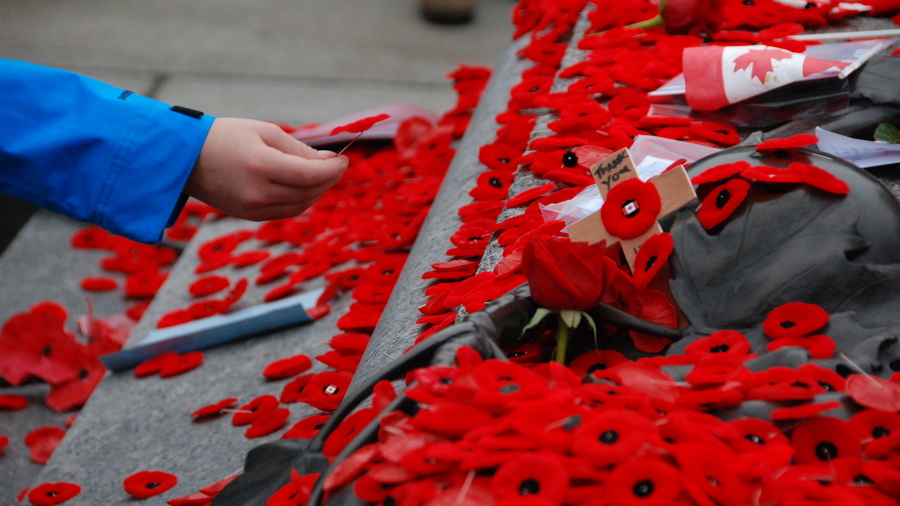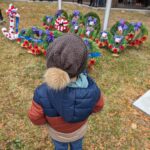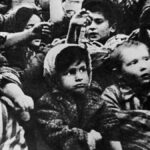Culture, Historical Essays
A Christian Remembrance Day in Canada
Last week, I wrote a column for The European Conservative on the Trudeau government’s attempt to secularize Remembrance Day by mandating that explicitly Christian prayers and symbolism be omitted. The stated reasons for this were two-fold: first, to avoid triggering members of the military who might identify as irreligious and second, because many faith traditions are considered offensive to members of the “LGBTQ community.” I hoped that these directives would be ignored on the ground, and I am very pleased to report that in the small town of Tillsonburg, at least, they were.
It was a beautiful ceremony at the cenotaph, attended by hundreds of locals and their families as well as many Canadian veterans. The chaplain remarked several times on the heartening turnout, and one officer told us that he was grateful that so many had brought their children along. My children had the opportunity once again to meet several of the veterans. One of them was a 101-year-old man named Tom Boneham. “Come here, give an old boy a hand!” he said with a beaming smile, reaching out to my 6-year-old. It was a moment I hope she will remember—there are so few like him left now, and it is a privilege to meet those who assisted in the liberation of my own family in the Netherlands.
As it turns out, Boneham is the very last survivor of No. 30 Commando, known from 1943 to 1946 as 30 Assault Unit, the British Commando unit founded by Sir Ian Fleming “to accompany forward troops when a port or naval installation is being attacked and, if the attack is successful…to capture documents, cyphers.” It was based on the German Military Intelligence unit, the Abwehr. None of the recruits knew each other’s real names—Boneham later recalled that they knew Fleming merely as the madman. “We didn’t know it was Fleming, but they used to say, ‘The madman’s got something for us to do know,” he said. The unit was disbanded after World War II and declared top secret—the work they did remained largely unknown for a half-century.
Boneham was wounded in the shoulder in 1943, when Fleming’s commandos were sent to gather intelligence during the invasion of Sicily. “We could just see a trickle of smoke from Mount Vesuvius and we were so eager to see the volcano,” Boneham remembered. “And the guy said, ‘You won’t see that until you fight your way there!” He didn’t make it—after being shot, he awoke on a hospital ship. He didn’t even know how to reconnect with his fellow commandos after the war—he didn’t know their real names. By 1952, Boneham was back in Canada, where he got married. In the early 1990s, he moved to Tillsonburg, where he lives still. Sir Ian Fleming used the exploits of his commandos to fill the pages of his world-famous series of James Bond spy novels.
The Remembrance Day ceremony, held in honour of and in the presence of such heroes, held all the solemnity of ceremonies past. A pastor and a chaplain prayed; we sang the Isaac Watts hymn “O God, Our Help, In Ages Past”; recited The Act of Remembrance; sang “God Save the King.” Before we left, the pastor delivered the benediction—a bit defiantly, perhaps? “The Lord bless you and keep you, The Lord make His face to shine upon you and be gracious to you. The Lord lift up the light of His countenance upon you and give you his peace.” And throughout the shuffling crowd, many voices of old and young joined for the last word: “Amen.” So be it.









Wow! Thanks for opening our eyes to the realities of this day in time. You are a very deep thinker and can articulate well. You embrace so many truths … that are slowly eroding away! Thank you for being bold enough to say it like it is without apology!
Our freedoms are slowly slipping away and our political leaders are demonically mandating to erode our heritage and Christianity, disrespectfully paralyzing and suppressing “prayer” with their “woke” agendas … claiming this is the peaceful, respectful way for all people!
On remembrance day … (smiley faced) Justin Trudeau has just waged a new “war” on Christianity, our heritage, and all people who fought to preserve Canada’s freedom and liberation to worship and honor our God; the God that has greatly blessed and watched over us, because of our faith, worship and prayers. Because of our ungodly leaders like Trudeau …(If we all ALLOW this to stifle and paralyze us as Christians) than we can soon expect to be persecuted and devoid of all peace and freedom … Our day of remembrance will be lost and forgotten.